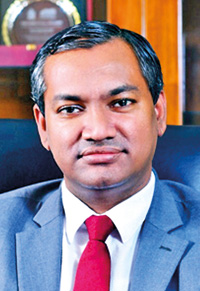Lanka’s TRC to wipe out dark spots
The Telecommunication Regulatory Commission (TRC) has embarked on a mission to wipe out the ‘dark spots’ or areas with low connectivity by investing Rs.1 billion in a project that will ensure total connectivity across the country.

Mr. Oshada Senanayake
“We are using part of the Telco Development Levy (TDL) to set up base stations starting from Ratnapura to negate the accessibility issues in areas that experience call drops,” Oshada Senanayake, Director General TRC told the Business Times. The regulator has found more than 2000 dark spots which have weak signals. According to data received from the Gamata Sanniwedanaya programme launched last December, TRC has observed that 80 per cent of the 152 Grama Niladari Divisions don’t have broadband coverage. Most of the voice drop calls is due to interference, Mr. Senanayake said noting that due to adhoc spectrum allocation the connectivity hasn’t been optimal. Now TRC is obtaining an ITU consultation on streamlining sector management in line with the global best management practices, so that there is no interference in the spectrum.
Mr. Senanayake noted that over the years 100 per cent of the TDL was remitted to the Treasury but now the need of the hour demands that the monies be used to develop the industry.
The industry had realised the need to have a shift in packages such as a dedicated education package. In a bid to facilitate the new consumption patterns, the regulator ensured that state-run schools and universities weren’t charged a fee to use Lanka Education and Research Network (LEARN), which is a specialised Internet service provider dedicated to supporting the needs of the research and education communities within Sri Lanka. Mr. Senanayake said that similarly, E-Thaksalawa, the national e-learning portal or open source Learning Management System for general education was also made free for consumption with zero data. “We started this in April and we are considering doing this across-the-board.”
He added that according to the latest International Telecommunication Union (ITU) report of 2018, Sri Lanka is in the 9th place in the cheapest mobile voice services (call rates). “This is the first time that Sri Lanka is in the top 10. With Hong Kong, Macau China, Luxembourg, Austria, UAE, Norway, Qatar and Bahrain making the rest of the top 10.”
In the cheapest mobile data services, Sri Lanka ranks in the 29th place and in the low-cost mobile data services packages, we are in the 14th place.
Sri Lanka is in the 26th place in the lowest fixed line costs but TRC anticipates that with the most recent offerings in cheap packages, this ranking will be better in the next ITU report. Mr. Senanayake said the main challenge during the COVID-19 lockdown was to give the requested infrastructure for operators. “There is a key shift in how consumers use data invoice now. Consumer packages given by operators’ pre-COVID-19 literally became redundant,” he explained. He noted that the consumption shut up remarkably. There is an extra 30 to 40 per cent traffic on networks. Mr. Senanayake added that this is where capacity planning with operators should be done carefully. “As a result, to facilitate the new consumption patterns, TRC executed a number of key initiatives. TRC was ensuring that service connectivity was intact during the lockdown. The industry rallied around,” he said noting that no phone lines were disconnected during this time.
He also said the 5G trials have started and the regulator has granted temporary spectrum for all the operators. “We will be obtaining a separate ITU consultancy for spectrum allocation in the 5G arena.”
In a bid to be ahead of the times, TRC has approved 5G ready telecommunication networking equipment.
The 5G enablement will need close proximity towers. “We intend to have passive infrastructure enablement using existing light poles to allow 5G equipment. We also intend to manufacture ‘smart’ light poles needed to get this going in Sri Lanka.”


